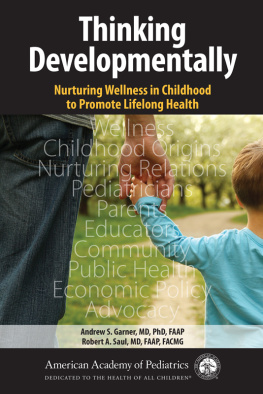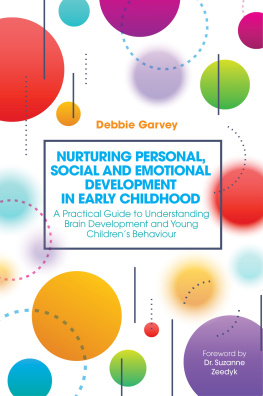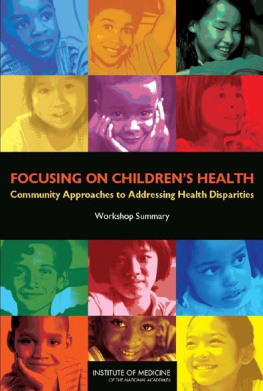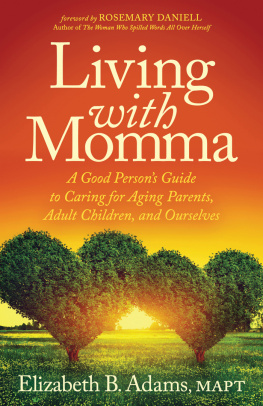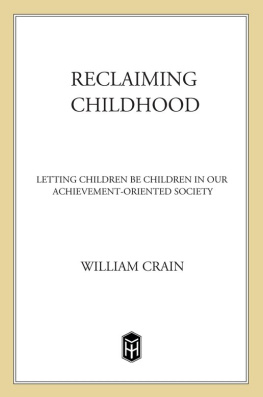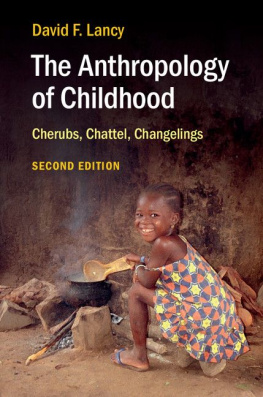Thinking
Developmentally
Nurturing Wellness in Childhood
to Promote Lifelong Health
Andrew S. Garner, MD, PhD, FAAP
Robert A. Saul, MD, FAAP, FACMG

American Academy of Pediatrics Publishing Staff
Mary Lou White, Chief Product and Services Officer/SVP, Membership, Marketing, and Publishing
Mark Grimes, Vice President, Publishing
Chris Wiberg, Senior Editor, Professional/Clinical Publishing
Theresa Wiener, Production Manager, Clinical and Professional Publications
Jason Crase, Manager, Editorial Services
Linda Diamond, Manager, Art Direction and Production
Sara Hoerdeman, Marketing Manager, Consumer Products
345 Park Blvd
Itasca, IL 60143
Telephone: 630/626-6000
Facsimile: 847/434-8000
www.aap.org
The American Academy of Pediatrics is an organization of 66,000 primary care pediatricians, pediatric medical subspecialists, and pediatric surgical specialists dedicated to the health, safety, and well-being of infants, children, adolescents, and young adults.
The recommendations in this publication do not indicate an exclusive course of treatment or serve as a standard of care. Variations, taking into account individual circumstances, may be appropriate.
Statements and opinions expressed are those of the authors and not necessarily those of the American Academy of Pediatrics.
Listing of resources does not imply an endorsement by the American Academy of Pediatrics (AAP). The AAP is not responsible for the content of external resources. Information was current at the time of publication.
Brand names are furnished for identification purposes only. No endorsement of the manufacturers or products mentioned is implied.
The publishers have made every effort to trace the copyright holders for borrowed material. If they have inadvertently overlooked any, they will be pleased to make the necessary arrangements at the first opportunity.
This publication has been developed by the American Academy of Pediatrics. The authors, editors, and contributors are expert authorities in the field of pediatrics. No commercial involvement of any kind has been solicited or accepted in the development of the content of this publication.
Every effort is made to keep Thinking Developmentally: Nurturing Wellness in Childhood to Promote Lifelong Health consistent with the most recent advice and information available from the American Academy of Pediatrics.
Special discounts are available for bulk purchases of this publication. E-mail Special Sales at for more information.
2018 American Academy of Pediatrics
All rights reserved. No part of this publication may be reproduced, stored in a retrieval system, or transmitted in any form or by any meanselectronic, mechanical, photocopying, recording, or otherwisewithout prior written permission from the publisher (locate title at ).
Printed in the United States of America
9-407/0518 1 2 3 4 5 6 7 8 9 10
MA0861
ISBN: 978-1-61002-152-4
eBook: 978-1-61002-153-1
EPUB: 978-1-61002-241-5
Mobi: 978-1-61002-242-2
Cover design by Linda Diamond
Book design by Peg Mulcahy
Library of Congress Control Number: 2017944378
Authors
Andrew S. Garner, MD, PhD, FAAP
Clinical Professor of Pediatrics
Case Western Reserve University School of Medicine
Primary Care Pediatrician
University Hospitals Medical Practices
Cleveland, OH
Robert A. Saul, MD, FAAP, FACMG
Professor of Pediatrics
University of South Carolina School of Medicine Greenville
Medical Director, General Pediatrics Division
Childrens Hospital
Greenville Health System
Greenville, SC
American Academy of Pediatrics Reviewers
Council on Genetics
Department of Federal Affairs
Section on Developmental and Behavioral Pediatrics
To all of our families:
the ones for whom we care so deeply,
and the ones who have so ably cared for us
Contents
Preface and Acknowledgments
If I have seen further, it is by standing on ye shoulders of giants.
Sir Isaac Newton
T his is not your typical book. Originally envisioned as cross between From Neurons to Neighborhoods it is both an approachable summary of developmental science and an unapologetic argument for change. Bringing such a hybrid to fruition has been a team sport and a true collaborative effort. Ultimately, it began with the innumerable scientists and investigators over the ages who have applied their skills to better understand the origins of disease and wellness, the mechanisms of human development, and the best ways to translate the latest science into practice and policy. They are the giants who have allowed us to see and expound on the inextricable links between epigenetics, neuroscience, life course theory, the practice of pediatrics, and many of our societys most intractable problems.
But envisioning a book is one thing; actually producing it is quite another. For taking a chance on a hybrid book that was decidedly outside its traditional purview, we are indebted to the American Academy of Pediatrics (AAP). In particular, we are grateful to our developmental editor, Chris Wiberg; the AAP Publishing leadership, including Jeff Mahony and Mark Grimes; Chief Product and Services Officer/SVP, Membership, Marketing, and Publishing Mary Lou White; and the terrific marketing and sales staff, including Kathy Juhl, Sara Hoerdeman, Linda Smessaert, and Elyce Goldstein, led by Marirose Russo and Mark Voigt. We are also thankful for the many reviewers, including Nate Blum, John Duby, Jim Duffee, and Jordan Hutchinson, whose careful attention to detail and clarity has made this book the best it can be.
Finally, as pediatricians, we owe our greatest debt to all of our families. To be sure, our personal families have provided enduring support, encouragement, and patience with us as we have disappeared for days at a time to review the latest research, to reflect on what it might mean, and to obsessively write one draft after another to make a clear and compelling case that the advances in developmental science are transformational. But the families we see in our clinics are the ones that keep us awake each night and inspire us every day. We lose sleep because we know that, despite their parents best efforts, too many children are not having their most basic biological needs met, and we understand how that sets a questionable foundation for future learning, behavior, and health. Still, we are inspired by these families unwavering commitment to their children, all too often in the face of tremendous adversity. Their undying resolve to do whatever is best for their children gives us hope that communities can be more caring, families can be more nurturing, and pediatricians can do much more to promote the foundations of lifelong health. But to turn this hope into reality, to expand parents unquestioned love for their children into a broader appreciation for the power of relational health, and to reframe pediatric care from child-centered to family-centered or even community-centered, there must first be a greater awareness of the recent advances in developmental science. We are most grateful to the entire team for the chance to do just that.
References
. Published February 5, 1675. Accessed December 28, 2017
. National Research Council, Institute of Medicine. From Neurons to Neighborhoods: The Science of Early Child Development. Committee on Integrating the Science of Early Childhood Development. Shonkoff JP, Phillips DA, eds. Washington, DC: National Academy Press; 2000
Next page
